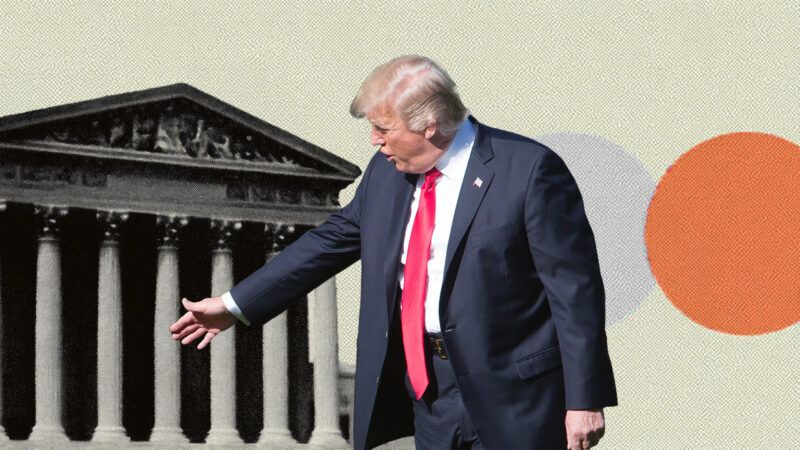Trump Hopes To Bully SCOTUS Into Upholding His Tariffs
Will it work?

President Barack Obama was roundly criticized by conservatives in 2012 after he used the presidential bully pulpit to pressure the U.S. Supreme Court into upholding the federal health care law known as Obamacare. It was April 2, several days after the Court heard oral arguments in National Federation of Independent Business v. Sebelius, and Obama took the opportunity to publicly lecture the justices against taking the "unprecedented extraordinary step" of overturning his signature policy. Two months later, the Supreme Court narrowly upheld Obamacare.
Next week, the signature policy of another president will be having its day in court when the justices hear oral arguments in Learning Resources v. Trump and Trump v. V.O.S. Selections, the consolidated cases challenging the legality of President Donald Trump's unilateral trade war. And much like Obama before him, Trump is now using the presidential bully pulpit in a blatant effort to influence the Supreme Court's decision-making process. Will it work?
You’re reading Injustice System from Damon Root and Reason. Get more of Damon’s commentary on constitutional law and American history.
As a legal matter, the Supreme Court has many excellent reasons to overrule Trump's tariffs. For one thing, the constitutional authority "to lay and collect Taxes, Duties, Imposts and Excises" as well as the authority "to regulate Commerce with Foreign nations," are assigned exclusively to Congress, which means that Trump is wielding power that the Constitution did not grant to him. His tariffs thus deserve to be struck down for violating both the constitutional separation of powers and the nondelegation doctrine.
Trump's tariffs also violate the major questions doctrine, which says that before the president may wield significant regulatory power, the president must first point to a clear and unambiguous delegation of such power to him by Congress. Yet the supposed tariff-making authority that Trump cites—the International Emergency Economic Powers Act (IEEPA)—does not even mention tariffs anywhere in its text, which hardly qualifies as a clear and unambiguous delegation.
But excellent legal reasons such as these do not always matter as much as they should in the minds of Supreme Court justices. You have probably heard the oft-hurled insult that the justices are merely "politicians in robes." Unfortunately, it is sometimes true that political considerations outweigh legal ones at the High Court, especially in hot-button cases that are thought to have major political ramifications.
Trump seems to recognize that the legal arguments in the tariffs case may not go his way. So he is openly pressuring the justices to tip the scales in his favor for political reasons. "If a Radical Left Court ruled against us at this late date," Trump declared in August, it would produce "a GREAT DEPRESSION." Likewise, earlier this month, Trump asserted that "if we don't win that case, we will be a weakened, troubled, financial mess for many, many years to come." Trump has even mused about attending the oral arguments in person, which is something that no sitting president has ever done. I guess Trump thinks he is capable of literally staring down the justices.
For the sake of argument, let's assume that the Supreme Court will give extra weight to nonlegal considerations in the tariffs case. Even if it does, however, the justices still have many better nonlegal arguments at their disposal than Trump's self-serving pronouncements. For example, the justices would be well served if they paid heed to a friend of the court brief filed by trade and economic policy experts Scott Lincicome, Colin Grabow, and Clark Packard, who explained why Trump's claims of economic doom if he loses "are groundless and should be ignored." As they pointed out, "there is little merit to the government's frequent public claims about the parade of horribles that would befall the nation if the IEEPA tariffs were invalidated. The United States has survived—and in fact has thrived—without IEEPA tariffs, and there is little doubt that it would do so again."
Trump wants the Supreme Court to put politics first in the tariffs case. But given the overwhelming economic evidence arrayed against his tariffs, Trump might want to be more careful about what he wishes for.


Show Comments (40)